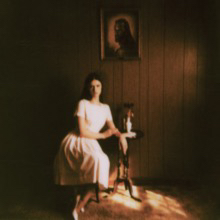The Southern Gothic aesthetic has always fascinated me. From the novels of William Faulkner and the short fiction of Flannery O’Connor to movies like Mississippi Burning and Natural Born Killers, the unique mood of the South’s seedy underbelly has always intrigued me. My favorite works of Southern Gothic art tend to deal with the internal conflicts of the region – such as the clash between the grotesque, haunted, and tragic aspects of the South with the supposedly serene, familial, and comforting idea of Southern hospitality.
In all my listening experience, I’ve found no album that pinpoints the specialty of the Southern Gothic idea better than Hayden Anhedönia’s (stage name Ethel Cain) 2022 album Preacher’s Daughter. This album captures the tragedy, dark humor, cliches, nuances, and atmosphere of the Southern Gothic idea flawlessly.
The character of Ethel Cain plays a large part in understanding Preacher’s Daughter. With the first lyrics of the LP being “these crosses all over my body, remind me of who I used to be,” Hayden immediately reveals that she will be using her Southern Baptist upbringing to create a character that reflects her real life, but not her real identity. Ethel Cain is a Southern, deeply American, elegant, scarred, mystical, religious, trans musician. In this way, Ethel embodies the Southern Gothic “ideal”. She has suffered abuse, experienced relationship trauma, and been judged for her transgender identity. Ethel sings about all of these subjects, but juxtaposes them with the sunnier side of the South: her own idyllic Southern love stories and her solace-giving personal relationship with God.

Ethel Cain is a tried and true Southern girl. Hayden has said she “feels like a piece of the South,” and the opening lyric references the multitude of cross tattoos on her body. “I feel like the South is covered in crosses…so I’ve started covering myself in crosses,” she says. Even in her music videos, you can see trucks, churches, cigarettes, farms, suburbs, bicycles, mullets, crosses, objects that all distinguish the American South.
“These crosses all over my body \ Remind me of who I used to be”
Now, to the album. With “Family Tree (Intro)” and “American Teenager” Hayden quickly establishes the themes of religion and trauma that are scattered across the album to a literary degree. She expresses her unfortunate home situation by saying she’s “swinging by her neck from the family tree” and sings about her parents (especially her abusive father’s) disapproval of her identity. On American Teenager she continues this idea by painting scenes of Southern life as a teen and expressing her discontent over how she was raised. Ethel admits that a lot of her religious involvement was her “doing it for her daddy.”
Like many lyrics on the album, this one carries a twofold meaning. Hayden often uses the word “dad,” “father,” “daddy,” etc. to refer to her real father and her heavenly father (God). This highlights that the trauma Ethel experienced from her father and other mentors caused her to question the goodness of God. She asks a familiar question: if God loves me, then why do I suffer?
She introduces the loss of her first partner in the song “House in Nebraska,” one of the saddest songs I’ve ever heard. She fantasizes about being back in an abandoned house she used to go to with her lover and opens up about the depression she faces from losing him. On this song and others (“Western Nights”, “Ptolemea”) Ethel discusses how she struggles with feeling deprived of agency. She calls her partner “man” but herself “girl,” says “If I died tonight I’d die yours,” and “I’m so alone without you, baby.” This comments on how Ethel feels powerless before an all-powerful God, as well as her feeling powerless in situations of distress (i.e losing a partner and being abused)
“You know, I still wait at the edge of town / Praying straight to God that maybe you’ll come back around”
Ethel gives ample focus to the religious trauma that comes from being a preacher’s daughter. On “Hard Times” she discusses her trauma from being sexually abused by her father. Ethel feels a lot of pain from her abuse, and this trauma plays a major role in her complicated relationship with religion. Ethel comes to the difficult understanding that “That some types of love can be bad.” This mirrors Ethel’s spiritual relationship with God as she later accepts – not without some trouble – that despite God’s love for her, he can still fill her life with suffering.
“Thoroughfare” weaves a masterful and entertaining love story of a disinterested man named Isiah traveling across the country with Ethel and eventually falling in love with her, mostly because he couldn’t find a lover anywhere else. It could make a great short story. It appears like the two could be star-crossed lovers, but in “Gibson Girl” we see that Isiah begins to act abusively towards Ethel, drugging her and taking advantage of her incapacitated state. Isaiah’s actions being reminiscent of her father’s abuse underscore the theme that trauma can be passed down through the generations.
In “Ptolomea”, a song named after the inner circle of hell in Dante’s Inferno, Isaiah kills Ethel. After an eerie opening that sounds like the devil himself, Ethel juxtaposes her love for the blood of Jesus with Isiah’s murderous love for Ethel’s blood in the lyric “You love blood too much / but not like I do.” The song, marked with references to the Bible and audible recreations of Hell, marks Ethel’s ascension to the afterworld.
“Blessed be the Daughters of Cain / Bound to suffering eternal through the sins of their fathers committed long before their conception”
Following two instrumental tracks that signify Ethel’s entrance into the afterlife, Ethel realizes several important things on “Sun Bleached Flies” about her relationship with religion. One of these is the fact that “God loves you but not enough to save you”. Ethel takes an interesting stance here by placing limits on God’s love. Rarely do you hear “but” after “God loves you,” but Ethel’s life has not been one showered with love. She comes to terms with the fact that her devotion to religion doesn’t promise her an easy life.
This song ends in a beautiful conversation with God where she accepts religion even if it means suffering, and even death. She expressed this resolution by repeating “If it’s meant to be then it will be.” She’s left all alone with no option but “taking care of herself.” She has to put aside her doubts and trauma and trust that there can be a relationship between her true self and God that can end the trauma that has been passed down to her.
“I forgive it all as it comes back to me”
Preacher’s Daughter maintains a constant level of unrest, tension, and eeriness among moments of comfort and bliss, which I find makes it an excellent example of prime Southern Gothic. With moments like the demented digital chopped sermon on the intro “Ptolemy” to the catchy chorus of “American Teenager”, the dimensions of the album can astound. The vocals echo church choirs, the instrumentation lineup replicates church bands, and the religious imagery, implemented methodically and with purpose, drives the haunted feeling home. Hayden’s deep-rooted understanding of Southern culture allows her to truly capture an atmosphere that I have never seen represented so well in music.
“God loves you, but not enough to save you”
The album culminates centuries of historical atrocities and cultural prosperity in the South, in addition to representing the multigenerational trauma that has followed Southern family trees for centuries. It’s extensive farm fields that could go on forever, men in overalls chain-smoking Marlboro Reds, big red-painted tractors, and memorized bible verses. It’s moonshine, and stories of the past. It’s a belief that under all the darkness and violence of the South, there rests something worth saving.


Leave a Reply